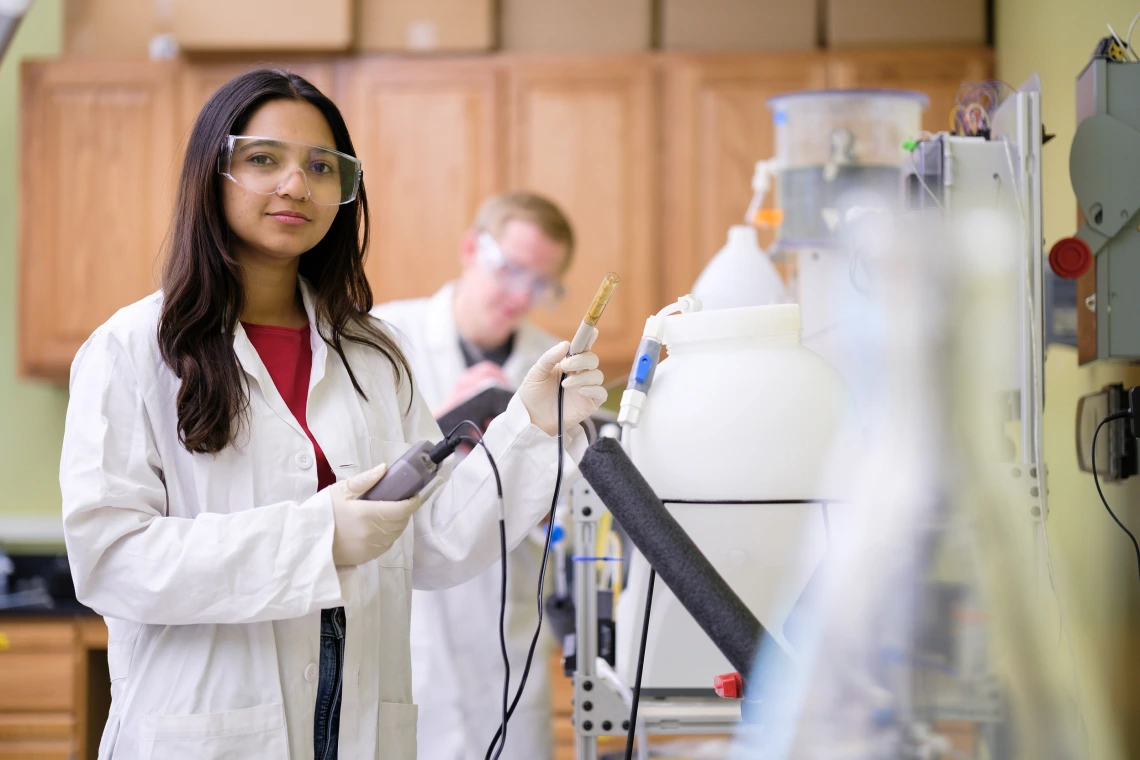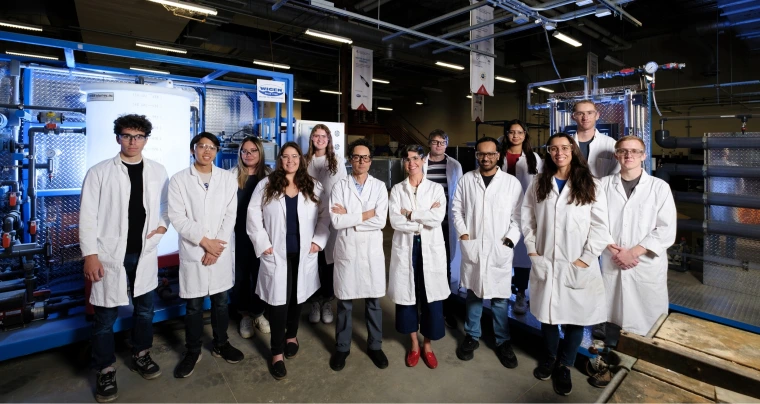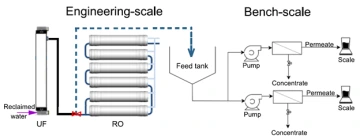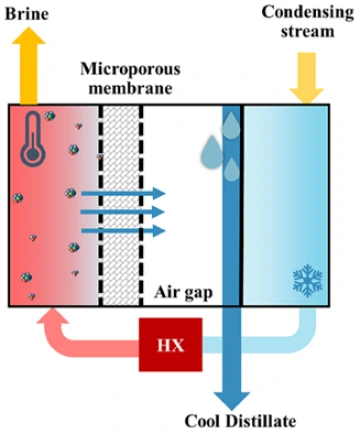Water reuse advanced by WEST engineers

Julius Schlosburg
The Chemical and Environmental Engineering (CHEE) team at WEST Center is a robust and active group comprised of over 20 staff and students of all levels. Led by Dr. Andrea Achilli and Dr. Kerri Hickenbottom, this substantial research unit tackles questions of water reuse. With demand for drinking water increasing and communities seeking alternative sources, the efforts of this team help to develop innovative systems capable of producing safe and reliable water supplies.

Some of the members of the Chemical and Environmental Engineering research team at WEST Center. Photo credit: Julius Schlosburg
Several recent publications highlight the contributions of WEST Center researchers.
- Image

Schematic of the experimental setup for the RO-NF comparative study. The feed water from the engineering-scale RO system was collected then pumped through two bench-scale cells, each containing different types of membranes. Source: M.A. Alhussaini et al. 2024.
In a recent publication (June 2024), “Comparative analysis of reverse osmosis and nanofiltration for the removal of dissolved contaminants in water reuse applications,” authors Mohammad A. Alhussaini, Bianca M. Souza-Chaves, Varinia Felix, and Andrea Achilli compare nanofiltration (NF) and reverse osmosis (RO) membranes. Both membranes provide an effective barrier against trace organic contaminants. As stated by the authors, however, “the use of RO is being challenged by NF, primarily due to NF’s potential to achieve similar contaminant removal as RO but with higher productivity and lower energy requirements.”
In the study, RO and NF membrane elements were tested in the engineering scale system at WEST Center. Results demonstrated the potential of dense NF membranes to serve as an energy-efficient barrier for contaminant removal.
Another recent study is described in the publication, “Productivity, selectivity, and energy consumption of pilot-scale vacuum assisted air-gap membrane distillation for the desalination of high-salinity streams” (March 2024). The study, undertaken by Marco Malaguti, Luke K. Presson, Alberto Tiraferri, Kerri L. Hickenbottom, and Andrea Achilli, “evaluates the productivity, energy consumption, and selectivity of a pilot-scale air gap membrane distillation system by combining experiments and modeling activities.” The authors note that membrane distillation (MD) is gaining interest because it can desalinate high-salinity streams with substantial water recovery rates. MD systems require a high (thermal) energy input; however, they are quite flexible in terms of feed salinity compared to RO and can be powered with low-grade heat and renewable energy sources.
As pilot-scale research is critical to understanding the behavior of MD systems, the WEST-led research team embarked on a multi-parameter investigation of one MD configuration, the vacuum-assisted air gap membrane distillation (V-AGMD) system. Results of the study offer guidance with respect to the technology's potential and considerations for full-scale utilization.
- Image

System schematic for an AGMD System. Source: V. Felix et al., 2023.
A third article, “Concentrate circularity: A comparative techno-economic analysis of membrane distillation and conventional inland concentrate management technologies,” was authored by Varinia Felix, Mukta Hardikar, and Kerri L. Hickenbottom and published in December 2023. While inland desalination with RO offers a promising alternative for water-scarce regions, large volumes of concentrated brine are generated as a byproduct of the process. MD is an alternative to more conventional approaches for brine management, facilitating brine minimization as well as water recovery maximization and energy-efficiency benefits.
As described by the researchers, “a techo-economic assessment (TEA) of air-gap MD (AGMD) for RO concentrate management was performed and compared to three conventional concentrate management systems: evaporation ponds, deep-well injection (DWI), and concentration-crystallization.” Results of the study demonstrated that AGMD is a competitive concentrate management technology that offers an economical and superior water recovery option for regions relying on reuse and desalination.
For more information, see the full articles available below:
Mohammed A. Alhussaini, Bianca M. Souza-Chaves, Varinia Felix, Andrea Achilli. Comparative analysis of reverse osmosis and nanofiltration for the removal of dissolved contaminants in water reuse applications. Desalination, Volume 586, 2024, 117822, ISSN 0011-9164.
https://doi.org/10.1016/j.desal.2024.117822.
Marco Malaguti, Luke K. Presson, Alberto Tiraferri, Kerri L. Hickenbottom, Andrea Achilli. Productivity, selectivity, and energy consumption of pilot-scale vacuum assisted air-gap membrane distillation for the desalination of high-salinity streams. Desalination, Volume 582, 2024, 117511, ISSN 0011-9164.
https://doi.org/10.1016/j.desal.2024.117511.
Varinia Felix, Mukta Hardikar, Kerri L. Hickenbottom. Concentrate circularity: A comparative techno-economic analysis of membrane distillation and conventional inland concentrate management technologies. Desalination, Volume 574, 2024, 117213, ISSN 0011-9164.

